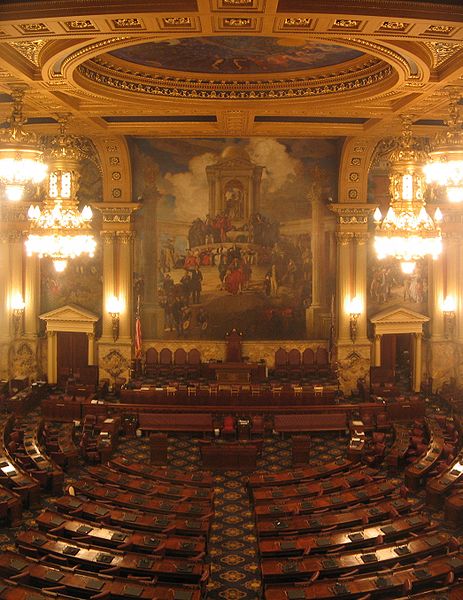Posts
State House Returns to Voting Session on Monday
/1 Comment/in News /by PAMattersThe state house will take a break from its summer break to return to voting session on Monday. A piece of the budget package needs to be finalized.
The House passed the fiscal code on July 1st, after adding an amendment regarding payday lending. The language indicated that the Senate and House majority leadership intended to pass legislation establishing a new schedule of rates and charges by October 31st.
The house adjourned until September, with only a non-voting day on the schedule for July 8th to sign bills and finish up other business. But on July 3rd, the Senate stripped out the payday lending language and sent the fiscal code bill back to the house. On the same day, the senate reluctantly approved the public welfare code, as amended by the house. Language on Medicaid expansion added by the senate had been stripped out by the house.
The state budget secretary warned that lack of final action on the fiscal code could have negative effects on state government. Governor Tom Corbett asked legislative leaders to pass it as soon as possible. The code includes language authorizing the spending of hundreds of millions of dollars, including some funding for higher education and additional money to help Philadelphia’s struggling public schools.
After house leadership looked at whether final action could wait until September, Speaker Sam Smith called the house back for a voting session at 1 pm on July 15th.
The delay in final passage of the fiscal code has led some to debate whether the budget for this fiscal year was really on time. The Governor did sign the General Fund budget before the start of the new fiscal year.
Franklin and Marshall College Political science professor Terry Madonna sees the dispute between the State House and Senate over the fiscal code a sign of serious distress between the two chambers. There were also big differences between the house and senate over key items in Governor Corbett’s agenda; liquor privatization and transportation funding. Neither won final approval before lawmakers took their summer breaks.
Is Penn State’s Board of Trustees Too Big?
/in News /by PAMattersGovernance changes are ongoing at the Penn State Board of Trustees. It’s already added a public comment period at meetings and imposed new 12-year term limits on members. In May, trustee James Broadhurst tells lawmakers the board will take up the recommendations of the Committee on Governance and Long-Range planning that he chairs. Those plans include changes in the status of the university president and governor, making both non-voting members of the board. But Broadhurst says they are not recommending a change in the size of the board at this time.
“There is no model or best practice that speaks to the optimal size or makeup of a university board of trustees,” Broadhurst testified before the Senate State Government Committee this week. Penn State’s board has 32-voting members. If it votes to change the status of the president and governor, there would be 30-voting members.
But trustee Anthony Lubrano fears the can will get kicked down the road until governance reforms are no longer a priority. “Membership should be reduced to a number that allows for the inclusion and active engagement of the entire board,” Lubrano testified before the committee.
For comparison, other Big Ten universities have much smaller boards (Ohio State 19, Michigan 9). “They have to be actively engaged… this is a $4.3-billion dollar enterprise… this is serious business,” says Lubrano.
Senate State Government Committee chairman Lloyd Smucker (R-Lancaster) will call additional hearings as he tries to find consensus on whether, where and what legislative action is warranted when it comes to Penn State governance.
State Senator Working on “Caylee’s Law”
/in News /by PAMattersThe Casey Anthony trial is sparking a legislative effort in Pennsylvania. State Senator Larry Farnese (D-Philadelphia) plans to introduce “Caylee’s Law”, named after the Florida girl who was missing a month before her disappearance was reported. The 2-year-old was later found dead.
Concealing the death of a child is only a first degree misdemeanor in Pennsylvania right now. Senator Farnese wants to change that to a third degree felony. The current penalty is a maximum of 5 years in jail and a $10,000 fine. Raising the degree of the charge would increase the maximum sentence to 7 years and the fine to $15,000. Farnese says he was surprised to see concealing the death of a child is currently a minor offense in Pennsylvania.
Farnese also wants to add a new offense, neglecting to report a missing child, making it a first degree misdemeanor. He says they would want to consider the state of mind and the intent of a potential defendant.
He believes the state needs to move quickly in addressing this issue. Farnese hopes Congress will consider getting a national law on the books to make sure this never happens again. He says regardless of the jury’s verdict in the Anthony trial on the murder charges, most people agree the mother’s conduct following her child’s disappearance was shocking and reprehensible. He says we have to address the fact there’s nothing on the books right now to protect the children.
Casey Anthony was charged in the death of daughter, Caylee, but acquitted by a Florida jury of all charges except four counts of lying to authorities.
Forcing Act 47 on Harrisburg?
/in News /by Brad ChristmanUnder the state’s Act 47, cities can be declared financially distressed, setting the stage for debt restructuring and other recovery mechanisms. Under a bill passed by the Senate Tuesday, the process could be taken a step further, giving the state the power to establish a management board and mandate Act 47 for cities like Harrisburg.
The state’s capital city is in trouble, and officials are mulling over a possible bankruptcy filing that critics say would be devastating. The Senate bill, sponsored by Jeff Piccola (R-Dauphin) would block such a filing. The bill also includes a provision that would withhold state funding if the city or management board fails to “identify, sell, lease or dispose of its assets.”
The management board would be comprised of three members, two appointed by the governor and one by county commissioners where the city is located. While the measure would affect any city of the 3rd class, the bill is a direct response to the ongoing problems in Harrisburg, which is groaning under the weight of enormous debt mostly tied to a financially disastrous incinerator project.
Piccola says Harrisburg officials have “thumbed their nose” at Act 47 for over a year and bankruptcy is simply not an option.
The bill now goes to the state House of Representatives.
Final Days of the State Budget Process Are Here
/in News /by Brad ChristmanBoth the state House of Representatives and state Senate gaveled in rare Sunday voting sessions over the weekend, as the two chambers brace for the final flurry of legislative activity expected this week before the summer break. Thursday is the deadline for the state budget, and despite some minor delays in the Senate over the weekend, leaders still say the deadline can be met for the first time since 2002.
In addition to budget-related bills, House lawmakers dealt with a distracted driving measure that would ban all texting while behind the wheel and legislation that limits liability for damages to the percentage of responsibility in civil lawsuits. Those bills could see final House action this week.
The Senate is expected to begin working through budget amendments on Monday after dealing with non-preferred appropriations bills for state-related universities among its action on Sunday. The debate over funding for higher education, which was a big part of Sunday’s floor activity, is expected to continue this week.
Off the floor on Sunday, House and Senate Democrats continued their call for a Marcellus Shale extraction tax or state impact fee. Governor Tom Corbett says he won’t even consider such a proposal and he wants any “impact fees” kept local and completely separate from the General Fund budget talks.
Another Good Revenue Month for PA
/1 Comment/in News /by PAMattersMay’s tax receipts have been tallied, and the Department of Revenue reports that collections exceeded estimates by nearly $34-million, or 1.9%. That means Pennsylvania’s revenues are outpacing estimates by a total of $539-million through 11-months of the fiscal year. “It just points out once again how bad the Republican budget that was passed last month actually is,” says Bill Patton, a spokesman for House Democratic Leader Frank Dermody (D-Allegheny). A GOP-backed, $27.3-billion dollar budget bill passed the House last month with zero Democratic support. It would not have used any of the current fiscal year’s excess revenue. “We should use a good bit of this surplus revenue to restore cuts that were made in the House Republican budget, and we think we can do that in the month of June,” Patton tells us.
The notion of tapping into that money is a bipartisan one over in the Senate. “We have proposed using some of the revenue surplus that exists to help soften the impact of cuts in the education area, cuts to hospitals,” says Senate Republican spokesman Erik Arneson. “This gives us continued reason to think that it can be done in a fiscally responsible way.” However, Arneson cautions that while the economy appears to be recovering, there are still “some serious soft spots.”
Looking at how the state’s major revenue sources fared in May: sales taxes and corporation tax receipts were above estimate. Personal income tax revenue was below estimate for the month, but still 2.1% above estimate for the fiscal-year-to-date. In an email to his colleagues, Wednesday, House Democratic Appropriations Chair Joe Markosek (D-Allegheny/Westmoreland) pointed out that May is one of the smallest revenue collection months. He suggests that further surplus could be posted in June, which is a more significant month for state revenues. Both the House and Senate are in recess until June 6th, but state budget matters will get top billing between then and the June 30th budget deadline.
Committee Gives Green Light to Octane Testing Bill
/in News /by PAMattersAlaska, Nebraska and Pennsylvania are the last three states without required tests for octane levels at their gas pumps. “Just recently Maryland who passed the legislation did a study, and they found substantial variations in the testing,” says State Senator Stewart Greenleaf, the prime sponsor of SB 341. Greenleaf’s legislation would require the Department of Agriculture to randomly test for octane levels in gasoline. It has the support of the Pennsylvania AAA Federation.
Executive director of the Pennsylvania AAA Federation Ted Leonard points out that a gallon of regular gas averages about $3.80 in Pennsylvania (as of Tuesday afternoon). “Given that high price of gasoline, consumers should be assured that they’re getting what they’re paying for,” he tells us. Different engines are built to run on different octane levels, and the problem is that you may be paying for 93-octane, but receiving 87. While the 87 may cost $3.80, Leonard says premium gasoline is averaging $4.06 in the Keystone State. While Leonard does not believe discrepancies are widespread, he points out that motorists could take a double hit: “You’re not getting what you pay for and secondly damaged engines and fuel gauges… can be expensive repairs.”
The state Department of Agriculture currently tests gas pumps to ensure that you’re getting the gallon you paid for. We’re not assured of the composition of that gallon of gas. Sen. Greenleaf says SB 341 with give the Department of Ag the authority to implement and enforce the law. He believes random testing will control costs while providing piece of mind. The bill was unanimously voted out of the Consumer Protection and Professional Licensure Committee last week. Up next is the Senate floor.
Supporters Say Good Samaritan Bill Would Save Lives
/in News /by PAMattersAnyone under 21, who calls 911 to help a drunk friend, would have legal immunity from underage drinking charges under SB 448. Senator John Rafferty (R-Montgomery) is the prime sponsor, and he thanked his colleagues on the Senate floor, following this week’s unanimous vote. “This is a bill designed for good Samaritans to save lives, in a much-needed cause.”
It has the support of organizations like the Pennsylvania District Attorneys Association and Students Against Destructive Decisions. “It’s better for them to have the opportunity to get the help for their peers, and to have a way to resolve it amongst themselves, that they’re not going to be liable for this,” says state coordinator for SADD Felicity Debacco-Erni. She says underage drinking is a serious charge, and this bill addresses a serious issue. “It’s a decision that unfortunately a lot of students are making not to get the help, because they’re fearful of their own legal issues that will come into play.”
In a statement, Senator Rafferty said he doesn’t want to give minors a free pass, but neither does he want to discourage those who can help from seeking assistance. The 911 caller must provide their name, and must remain on scene until emergency assistance arrives. Before it gets to the governor’s desk, SB 448 must next pass the State House. It’s now awaiting action in the House Judiciary Committee.
Welcome to PAMatters.com, a new source for news and commentary from Pennsylvania’s capital. In addition to video, audio and pictures from the stories and events that affect YOU, you’ll also get some behind-the-scenes analysis via blogs from our award-winning staff of journalists.










